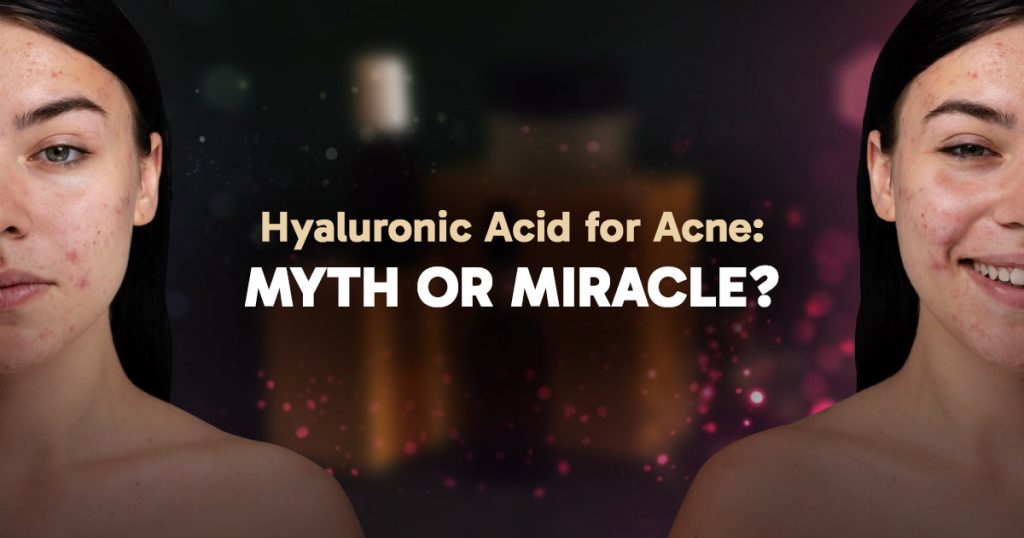Acne is a common skin condition that can be challenging to deal with. Finding the right treatment can be tricky, but one ingredient that has gained popularity is hyaluronic acid. But is hyaluronic acid good for acne?
What is Hyaluronic Acid?
Hyaluronic acid is an ingredient that naturally occurs in the body. It helps your skin retain moisture and stay hydrated. As we age, our bodies produce less hyaluronic acid, which can cause dryness and wrinkles. It’s used in many skincare products because of its ability to hydrate skin without being greasy.
Does Hyaluronic Acid Help Acne?
Hyaluronic acid does not directly treat acne like some other ingredients (such as benzoyl peroxide or salicylic acid), but it has several benefits for acne-prone skin. Here’s how hyaluronic acid can help:
Hydrates Without Clogging Pores
One of the main concerns for people with acne-prone skin is keeping their skin hydrated without making it worse. A 2017 study shows that hyaluronic acid not only helps retain moisture but may also help control sebum production, making it useful for preventing acne.
Many acne treatments can dry out the skin, resulting in additional outbreaks. Hyaluronic acid helps keep the skin moisturized without clogging pores, making it a safe option for acne sufferers. It absorbs moisture from the air, keeping the skin hydrated without adding additional oil.
Reduces Inflammation
Acne often comes with inflammation, which makes the skin red and irritated. Hyaluronic acid has anti-inflammatory characteristics that can help soothe the skin, reduce redness, and control inflammation. This is especially beneficial for those dealing with inflammatory acne.
Supports Skin Repair
Acne can damage the skin, leaving scars or rough patches. Hyaluronic acid can help with skin restoration by increasing collagen production and facilitating faster cell turnover. This allows the skin to recover faster, potentially minimizing the appearance of scars over time.
Hyaluronic Acid for Acne Scars
If you’ve had acne for a while, you might be left with scars that can take a long time to fade. Hyaluronic acid does not directly repair scars, but it can aid. Hyaluronic acid, by keeping the skin hydrated, can promote healing. This moisture can help scars heal more quickly, making them less apparent over time.
Incorporating hyaluronic acid into your routine may help make your skin look smoother and more even, even if you have acne scars.
Hyaluronic Acid Benefits for Acne
The benefits of hyaluronic acid for acne-prone skin go beyond just hydration. Here are the key benefits of using hyaluronic acid for your acne:
Non-Comedogenic
Hyaluronic acid is non-comedogenic, so it will not clog your pores. Since clogged pores are a common cause of acne, this makes hyaluronic acid a great choice for acne-prone skin. It moisturizes without causing breakouts.
Gentle on Sensitive Skin
Many acne treatments are harsh on the skin, causing inflammation and dryness. Hyaluronic acid is mild, making it suitable for delicate skin. It moisturizes without causing irritation and can be used in conjunction with other acne treatments.
Helps Maintain Skin Barrier
A strong skin barrier helps protect against pollutants, bacteria, and other factors that can worsen acne. When your skin is dry or damaged, it is more prone to breakouts. Hyaluronic acid helps keep the skin’s barrier strong by providing moisture and preventing dryness, which can help prevent acne flare-ups.
Does Hyaluronic Acid Cause Purging?
When trying new skincare products, some people worry about skin purging. This happens when a new product speeds up the skin’s cell turnover, causing a temporary breakout. However, hyaluronic acid does not cause purging. Since it’s a hydrating ingredient, it doesn’t accelerate cell turnover like some acne treatments do. If you have breakouts after taking hyaluronic acid, they are most likely caused by other products in your routine, rather than the hyaluronic acid itself.
How to Use Hyaluronic Acid for Acne
If you’re interested in trying hyaluronic acid to help with acne, here’s how to use it:
Apply After Cleansing
Start with a clean face. Use a mild cleanser to eliminate debris and oils before applying hyaluronic acid. It’s best to apply it to slightly damp skin, as this helps it draw moisture into the skin more effectively.
Combine with Acne Treatments
If you’re using acne medications, apply those first, then follow with a hyaluronic acid serum or moisturizer. This helps balance out the drying effects of some acne treatments and keeps your skin hydrated.
Consistency is Key
Consistent use of hyaluronic acid yields the finest outcomes. It may take some time to see noticeable improvements in skin texture or acne scars, but with regular use, you should start to see smoother, more hydrated skin.
How Hyaluronic Acid Helps Maintain Healthy Skin with Acne
Hyaluronic acid may not directly treat acne, but it plays an important role in supporting healthier skin. It improves the healing environment by keeping the skin moisturized, decreasing inflammation, and promoting skin restoration. Its gentle, non-comedogenic nature makes it a great addition to acne treatments, helping balance moisture without clogging pores. Overall, hyaluronic acid helps maintain healthy, clearer skin over time.
